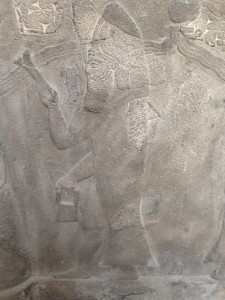There I was in the famous Pergamon Museum in Berlin staring at what appeared to be a high fashion magazine layout. The figures —clothed in fish costumes and carrying handbags—struck that intriguing note all trendy advertising campaigns aim for, but it was clearly NOT an editorial spread or an ad, it was the figures on an ancient Assyrian cistern. My 21st Century eyes read the water pails carried by fish-costumed priests as accessories. It was a lesson in why you see what you see.
My personal point-of-view has a lens cracked in unique places and inclined toward mystery fiction, art history, popular culture and travel experiences. Characters in fiction can, and in my opinion, should demonstrate their individual perceptions. One character might see humor in a sudden rainstorm on a boat ride while another would experience it as a minor tragedy. A character laughing at adversity is appealing, but not as dramatic as the character with a tragic viewpoint.
Both responses tell stories.
And that’s the point I’m circling around. What we see as individuals is dependent on who we are and our past experiences, influences, background and unique point-of-view. Storytellers should explore the way life has influenced the perceptions of characters.
A friend educated in a yeshiva did not recognize the halos in Flemish Renaissance paintings. The basic symbolism of Christianity was outside her frame of reference. Another friend always assumes a nefarious intention because his background has led him to believe that evil lurks behind every corner. A third friend survived the intellect-crunching background of growing up in a rigid religious cult. His world-view is jaded and allows for little mysticism or magic.
The more I pay attention to the assumptions and opinions of my friends, the more I grow to understand the wide range of conclusions drawn from the same data. What we see IS who we are and that is a wealth of stories!






Yes! And the same is true of people witnessing an accident or crime – no two ever ‘see’ the same thing, which is why witnesses are famously unreliable.
Yes, that’s another aspect of the perception question!
One observer sees a crime another see a prank a third sees street theater… We each see part of any given event, the part that makes sense to us. Must be tough being a cop getting statements on an incident that took place in a crowd.
Yes, but it’s also that personal POV that makes great, original writing (if you’re aware of it)!
EXACTLY! It’s the essence of an original character. Revealing that POV is a way to show a backstory, a world view and demonstrate individual insights. But it’s hard to do when you’re writing a many character story. Making myself a bit crazy right now with my novel-in-progress. It has a wild and wicked cast with a wide range of points-of-view.